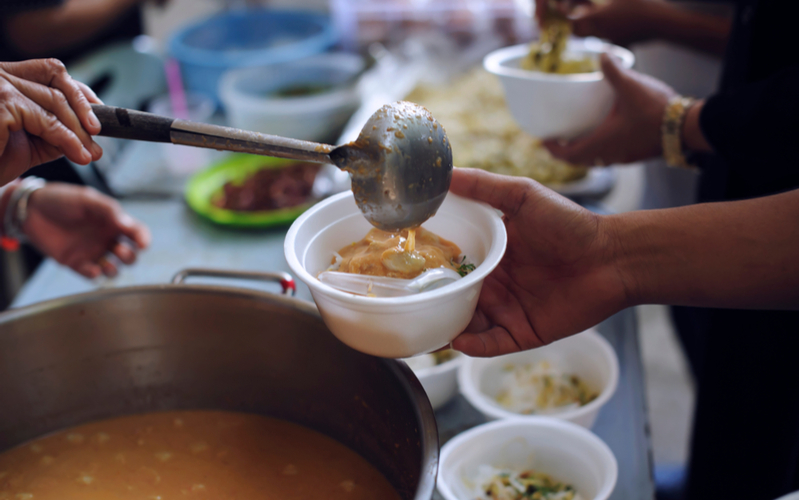Officials Pour Bleach on Food for the Homeless “for Their Safety”
When private citizens get together to help the needy, the government will undoubtedly show its face, rendering their efforts useless. That’s exactly what happened in Kansas City, Missouri, where health inspectors barged in on November 4, thrashing and bleaching food meant for the homeless so it would be inedible. The following week, however, officials chose not to interfere, and the Free Hot Soup KC group was allowed to carry on uninterrupted.
When asked why they destroyed the home-cooked meals, inspectors said volunteers didn’t have a permit.
Claiming to be looking after the homeless’ safety, health officials said the food, which is prepared by volunteers at their own homes, is not good enough for people living on the street. After all, home-cooked meals could expose the needy to food-borne illness.
“The group organizes volunteers to prepare food at homes and transports the food in personal vehicles to serving locations,” the official statement said. “The food is not kept at the required temperature for food safety.”
In addition, the group “chose not to obtain required permitting to follow safe food handling practices.” Right, because people starving to death really care about whether volunteers used gloves while cooking them meals at their own homes.
Volunteers Don’t Care About Regulations
Free Hot Soup KC’s administrator, Shelbi Meisch, told reporters that officials targeting them are discriminating against the homeless.
She continued, “It’s like saying there’s a problem, we want to sweep it under the rug and get rid of it. These are human beings and they deserve to be heard and seen.”
But despite the officials’ stance, Meisch added, taking part in a voluntary effort to help the homeless is none of the government’s business. After all, following the city’s regulations would be unthinkable to them, especially if they want to continue to afford to help those in need regularly.
“Do we want to get permits and food handlers cards? No, we feel it’s our individual right,” she told reporters. “We’d like to see something change not just here, but nationally so that people become more aware of the issues surrounding homelessness and have more freedom to become active in their community to do something about it.”
Cherith Brook Catholic Worker House’s Eric Garbison agreed, saying that the officials’ decision to destroy the work done by volunteers shows their bias against the needy “and the people who support them.”
But most importantly, Garbison noted, the local government is using this bias to exert power over the people.
By cracking down on efforts such as hosting picnics for the homeless, Garbison argued, officials want “to make illegal all things that make the homeless experience and give authorities the power to remove them.” That’s much like what lawmakers do whenever private or religious charities try to help the poor and low-income households by building charity hospitals, or when officials arrest private citizens for teaching their own kids from the comfort of their homes.
When it comes to how the state operates, the power imbalance is clear: bureaucrats will always act on behalf of the state apparatus and in favor of putting up more restrictions and obstacles, no matter who they hurt.
While the good men and women volunteering with Free Hot Soup KC feel officials are being especially harsh on them because of their work with the homeless, this story is just another example of government creating more problems rather than solving them. How do they get away with it? They claim it’s all in the name of safety.
The Solution Is Less, Not More Government
Free Hot Soup KC has helped the homeless locally since 2015. On Sundays, it organizes “picnics” at four Kansas City parks, offering the homeless homemade meals. In early November, officials carried out a coordinated sting on all four locations. Authorities say they decided to intervene after locals complained, although details about these complaints were never revealed.
Despite the organization’s tradition for caring for the local homeless, officials did not hesitate to destroy its work, claiming the food could be hazardous. What’s worse, when reporting on this story, the Kansas City Star proposed fixing the issue by getting the government more involved in the process, not less.
As noted by the Washington Post, the publication said, those city employees should become involved to help boost safety by overseeing “food distribution, alerting volunteers when food might not be safe.” But this would make the volunteers’ efforts more costly as food deemed unsafe by officials would have to be discarded.
In addition, the publication argued, volunteers should take classes offered by the Health Department on how to handle food safety, apparently oblivious of the fact that these volunteers have been providing homemade meals to the homeless for years. Had the homeless suffered because of the quality of the meals, we would know by now.
Forcing city officials to become more involved in this process would only help to slow volunteers down and make their efforts less effective. In the end, few if any people in need would have access to this food. But at least bureaucrats would get to sleep soundly at night, knowing they kept the homeless from getting sick — by keeping them hungry.











